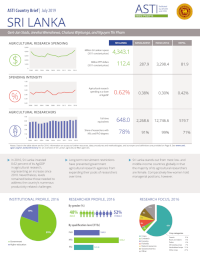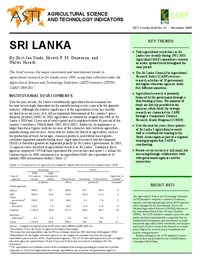Authors:
Padmini Girihagama, Michael Rahija, and Gert-Jan Stads
Year:
2012
Publisher
Back to:
During the first decade of the new millennium, Sri Lanka’s worsening security situation forced the national government to allocate an increasing share of public resources to national security. This was at the expense of other public investments, including agricultural research. Moreover, revenues generated by a cess on plantation crops were gradually channeled away from agricultural R&D. Both factors had a notable impact on the country’s total agricultural R&D spending, which declined by roughly one-third during 2000–2009.
Authors:
Stads, Gert-Jan; Gunasena, Herath P. M.; Herath, Walter
Year:
2005
Publisher
International Food Policy Research Institute (IFPRI); and Sri Lanka Council for Agricultural Research Policy (CARP)
Back to:
During 1981-2003, the number of agricultural researchers in Sri Lanka increased steadily. Agricultural R&D spending also rose throughout this period, albeit more erratically. In 2003, total expenditures amounted to $60 million (in 2000 constant prices). Research agencies focusing on export plantation crops reported remarkable increases in their total spending levels over the previous two decades. Combined spending totals at the eight agencies under MALLI, however, remained relatively unchanged during the same period.


